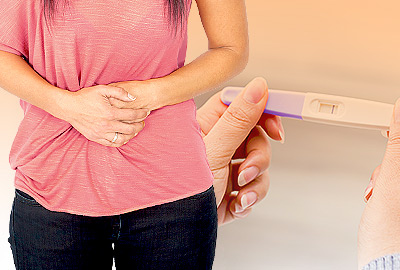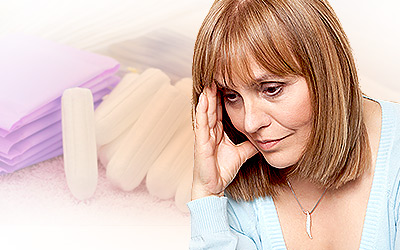During a woman's menstrual life, she will experience periods that occur in routine cycles lasting around 28 days, with two to five days of menstrual bleeding. When she enters perimenopause, however, hormonal changes in the body can upset this predictability. Estrogen and progesterone are the hormones responsible for the triggering and duration of periods, and when these become imbalanced during perimenopause, periods can occur sporadically, with heavier bleeding and several months passing between each bleed. While frustrating, this symptom can be managed through a series of lifestyle amendments and herbal remedies.
Herbal Remedies
Black cohosh and dong quai are herbs long associated with treating menstrual problems. Black cohosh has an estrogenic function in the body to regulate the hormonal imbalance that can cause irregular periods, and dong quai increases blood flow to the vessels in the uterus wall and stimulates the shedding of its lining (i.e., a period). Traditionally, these herbs are consumed in tea form. To counter irregular periods during the summer months, you could try refrigerating herbal teas and serving with ice to enjoy them as iced teas, or you could use powdered black cohosh and dong quai supplements.
Yoga
Exercise helps to prevent and relieve menstrual cramps associated with perimenopausal irregular periods, but the idea of physical exertion is unlikely to appeal when you're in pain. Yoga poses however, use stretches and controlled breathing to achieve physical and emotional relaxation, and you can exert yourself to a degree that's comfortable and suitable to you.
Meditation
Irregular periods during menopause often come with painful cramping. Meditation relaxes the body as well as the mind, and can physically relieve your discomfort. The practice also helps you mind focus, so it can help you deal with distractions and sensations in the body properly; this may help you to cope with painful cramps and override them mentally by concentrating instead on the energy of your thoughts and emotions.
Aromatherapy
Adding essential oils to your bathwater can help with managing the menstrual cramps that can come with irregular periods during perimenopause; try lavender, juniper, or birch. Using your knuckles or fingertips to gently massage the lower abdomen will have a relaxing effect on your muscles and help eliminate cramps.
Communication
Irregular periods are often a woman's first outward indicator that menopause is imminent. Menopause brings with it physical and emotional changes, perhaps the most significant being the end of a woman's reproductive life, and this can take some adjusting to. It's normal to feel a little sad about these changes, but try to remember that this is a natural process that all women go through. Talking to other women who have been through menopause or experienced symptoms like your own may help you adjust to this new phase of your life.
In terms of managing irregular periods on a practical basis, it is important to be prepared for unexpected bleeding. Carry sanitary towels or tampons with you at all times, bearing in mind that your periods may be heavier when they do occur and you may need to change your sanitary wear frequently as a result. Altering your lifestyle will help your body rebalance, emotionally and physically.
Sources
- Better Health Channel. (2013).Menstruation: Abnormal Bleeding. Retrieved March 28, 2014, from http://www.betterhealth.vic.gov.au/bhcv2/bhcarticles.nsf/pages/Menstruation_abnormal_bleeding
- National Health Service UK. (2013).Periods, Irregular - Causes. Retrieved March 28, 2014, from http://www.nhs.uk/Conditions/Periods-irregular/Pages/Causes.aspx
- National Health Service UK. (2013).Periods, Irregular - Treatment. Retrieved March 28, 2014, from http://www.nhs.uk/Conditions/Periods-irregular/Pages/Treatment.aspx
- National Institutes of Health. (2014).Menstruation. Retrieved March 28, 2014, from http://www.nlm.nih.gov/medlineplus/menstruation.html
- National Institutes of Health. (2011).Vaginal Bleeding. Retrieved March 28, 2014, from: http://www.nlm.nih.gov/medlineplus/ency/article/007496.htm




